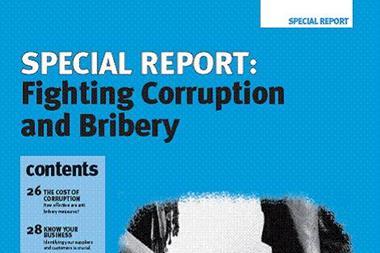As companies find themselves looking outside their normal areas of operation, Heyrick Bond Gunning expands on his clients’ experience in countries where corruption and bribery loom large
The current economic environment is pushing many countries into unfamiliar territories where they are more likely to encounter bribery and corruption. There are a host of issues that are likely to arise when operating in an environment where corruption and bribery are a pre-requisite in order to oil the wheels of commerce. Even as the US Foreign Corrupt Practices Act (FCPA) becomes the de facto anti bribery standard worldwide, over 50% of US executives – and a shocking 84% worldwide – know little to nothing of its provisions, according to Ernst & Young’s 10th global fraud survey.
It is almost inevitable that those countries offering the greatest rewards are also highlighted in dark red on Transparency International’s world map of bribery and corruption. Two examples that have affected our clients only go to exemplify the difficulties faced.
Democratic Republic of Congo
The US Department of State described corruption in the DRC in 2007 as ‘pervasive’. Transparency International’s 2007 Corruption Perceptions Index identifies the DRC as one of the 10 most corrupt countries in the world. Furthermore, the World Bank has reported that the DRC’s judicial system is one of the world’s six weakest in terms of enforcing commercial contracts. It is this institutional weakness that has allowed corruption to flourish.
At the lower levels, corruption is evident from the moment one enters the country, whether it is $50 required for an incorrectly dated yellow fever immunisation document or payments at police checkpoints. At the other end of the scale, the abundance of natural resources in the DRC enables corruption on an enormous scale as government officials use bribery to share in the profits. For example, it is estimated that in the mining sector, exports of large quantities of DRC copper and cobalt have been undeclared, and that 60-80% of the DRC’s 2005-2006 customs revenue was embezzled. A payment in kind or in cash is often required at every step of the process.
It is possible to operate without using bribery but this requires patience, time, an extremely robust anti bribery policy and above all, local knowledge.
Iraq: reconstruction
Iraq was ranked 118th in Transparency International’s 2003 Corruption Perception Index, with a CPI of 2.2, but descended to 178th in 2007 with a CPI of 1.4, making it the third most corrupt country in the world.
The demise of Saddam Hussein’s regime saw the removal of any form of state control and the country descend into anarchy. The population sought to compensate itself after years of repression, and institutionalised corruption replaced initial indiscriminate looting. Vast amounts of money poured into the reconstruction effort; billions of dollars remain unaccounted for and lost to corrupt practices.
In Iraq, allegations range from petty bribery to large scale embezzlement, expropriation, profiteering and nepotism. A Transparency International report has stated that the corruption in Iraq will probably become ‘the biggest corruption scandal in history.’ A Coalition Provisional Authority report by Stuart Bowen found that $8.8bn dollars from Iraqi oil revenues had been distributed by US administrators to Iraqi ministries without proper accounting procedures. Consequently the money has virtually disappeared.
While setting up a business in Iraq, I saw a variety of levels of corruption from bribes issued to customs officials through to the almost constant stream of ‘officials’ that waited at my hotel to demand payment for everything from office space and land to services that had not been delivered.
Even so, there still are numerous opportunities within Iraq, but it is necessary to undertake rigorous analysis prior to committing – performing due diligence on clients and opportunities involved, and ensuring the necessary mitigating procedures are put in place to counter the risks uncovered.
Tackling/mitigating corruption
There are a variety of initiatives in play to combat corruption and bribery from the United Nations Convention against Corruption to the Partnering Against Corruption Initiative (PACI), to individual corporate initiatives.
Organisations should:
• have a zero tolerance policy
• prohibit giving or accepting bribes – directly or through an agent or other intermediary
• identify high risk areas – political/charitable giving, gifts/expenses, ‘facilitation’ payments, business relationships
• have an effective programme to include a code of ethics, policies and procedures and administrative processes
• educate and train employees and ensure and accountability through guidance and oversight
• ensure policies are adhered to by suppliers
• build a consensus with stakeholders on approaches and specific activities to combat corruption
• implement consensus-based plans, capacity building in complementary skill areas including: community based monitoring and reporting; community analysis of options; revenue generation to support sustainable local monitoring, and participation in decentralised governance
• make agents and business partners explicitly aware of the company’s policies and expectations. It is the responsibility of managers to ensure that they comply with these policies
• have a whistle blowing/reporting facility.
Postscript
Heyrick Bond Gunning is managing director of Salamanca Risk Management, www.salamancarm.com



















No comments yet